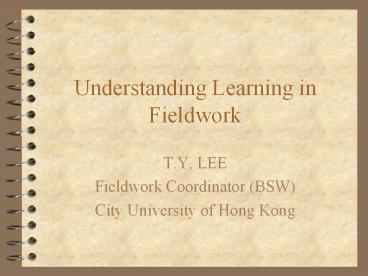Understanding Learning in Fieldwork - PowerPoint PPT Presentation
Title:
Understanding Learning in Fieldwork
Description:
Understanding Learning in Fieldwork T.Y, LEE Fieldwork Coordinator (BSW) City University of Hong Kong What learning is (Reay, 1994; Smith, 1982: 34-37) Why do I need ... – PowerPoint PPT presentation
Number of Views:114
Avg rating:3.0/5.0
Title: Understanding Learning in Fieldwork
1
Understanding Learning in Fieldwork
- T.Y, LEE
- Fieldwork Coordinator (BSW)
- City University of Hong Kong
2
What learning is (Reay, 1994 Smith, 1982 34-37)
- Why do I need to know about learning?
- What are the generally accepted observations
about learning that are clearly relevant to
understanding field instruction and learning? - What are the key factors of learning psychology?
- What are the components of learning?
3
Generally accepted observations about learning
- Learning is a continuous process.
- We are all hunger for learning.
- Learning comes from doing.
4
Key factors of learning psychology
- 1. Motivation
- 2. Relevance to personal interest and choice
- 3. Clear goals and objectives
- 4. Practice and learning by doing
- 5. Self-checking on progress (providing feedback)
- 6. Freedom to make mistake?
- 7. Freedom to learn in their own time, at their
own pace?
5
Components of learning
- 1. Knowledge (Cognitive) Concepts, facts,
procedures. - 2. Skills (Motor or Psycho-motor) Doing
- 3. Attitude (Affective) Feeling
- Only when you can do something can you actually
claim to understand how it is done.
6
The stages of learning 1
- 1. Unconscious incompetence
- Unaware of the complexity and detail of their
learning goals
7
The stages of learning 2
- 2. Conscious incompetence
- The need to change
- The need for encouragement
- The need for aims and objectives
- The need to see the benefit (motivation)
- The need to own the situation (feel fully
involved)
8
The stages of learning 3
- 3. Conscious competence
- You can perform a task but you are still at the
stage where you have to make a conscious effort
if you are to achieve the required standard.
9
The stages of learning 4
- 4. Unconscious competence
- You dont have to consciously review the core
parts of your learning each time you do
something. - But you still need regular supervision, support
and advice.
10
Why you dont learn
- 1. Lack of motivation
- 2. Unsuitable work environment (Psycho-social)
- 3. Inappropriate subject matter (Relevance)
- 4. Past experience (Bad habits)
- 5. Self-image
- 6. Inadequate study skills
- 7. Poor memory (ability to practice, concentrate
suppression)
11
More - Blocks of learning
12
More - Blocks of learning
13
More - Blocks of learning
14
More - Blocks of learning
15
Enabling yourself to learn
- 1. The importance of motivation
- 2. Four Initial motivators 1-4
- 3. Five Continuous motivators 1-5
16
Four Initial motivators
- 1. New Challenging
- 2. The way to succeed
- 3. Personal recommendation
- 4. A way of filling time
17
Five Continuous motivators
- 1. Passing the course
- 2. Self-assurance (Recognition and esteem)
- 3. Getting a good grade or promotion
- 4. Improved performance
- 5. Instructional design (objectives-driven with
regular assessment of learner progress)
18
Learning patterns in fieldwork
- Intellectual (thinking)
- Intuitive (feeling)
- Experiential (doing)
19
The end of this part.
- Do you want to know something about the three
different types of learners?































